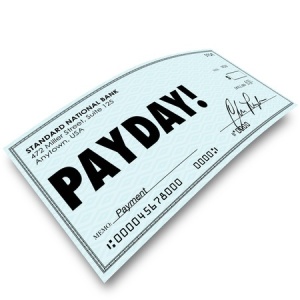How Much Can Your Business Afford to Pay You?
Every small business owner inevitability wants to know the answer to: How much should I pay myself? After all, it’s one of the reasons you went into business in the first place – to earn money. Unfortunately, there aren’t any set guidelines that outline when and how much you should be paid.
 However, here are three things you need to consider when paying yourself:
However, here are three things you need to consider when paying yourself:
- Your company’s cash flow.
Small business owners need to understand their business’s cash flow. After all, there’s a big difference between revenue and profit. Sure, you have money coming into your business. But you just can’t pay yourself first. You have expenses, such as taxes, payroll, fixed costs and overhead, that must be paid before you can pay yourself from the profits.
By working with a professional bookkeeper, like Grace Walker with The Payroll Department, you can get a better handle on your company’s revenue, expenses and profits. Plus, a bookkeeper can help you develop a budget to determine your salary. However, you need to realize if your business is just starting out, your cash flow may be limited or non-existent. Therefore, you may not be able to pay yourself. Or, you may decide you need to reinvest more of the profits back into your business. Your salary really depends on the growth stage of your business and how your company is doing.
- Your payment method
The legal structure of your business impacts how much you can pay yourself and when. Therefore, you should talk to your accountant or tax attorney to determine the best option for your business structure. For example:
- Sole proprietors or single-member LLC owners – You must take distributions from the business’s profits instead of a salary where FICA and federal and state taxes are withheld. Generally, you can pay yourself whatever amount, whenever you want.
- Partnerships or multiple-member LLC members – Similar to sole proprietors, your salary comes from the company’s profits. However, the amount of money and the way it is distributed is dependent on the operating agreements between the partners or members.
- C- or S-corporation – The owner of a C- or S-corporation is considered a shareholder, so he/she would receive a distribution of the business’s profits. However, if the owner also works as a corporate officer, he/she would also receive a salary via paycheck that is subject to payroll tax
- Federal and state taxes
As a business owner, you’re still responsible for paying federal and state taxes. Therefore, you should work with your bookkeeper to plan and set aside money to pay estimated quarterly taxes. Then at the end of year, you will report your actual income when filing your tax return. If you’ve overpaid your quarterly taxes, you’ll be eligible for a refund.
Current, Organized Financial Records Can Help You Determine Your Pay
Whether you’re a startup or an established business, good bookkeeping records can help you analyze the financial state your business, so you can determine how much your business can pay you. Contact Teresa Ray at The Payroll Department to learn more about our bookkeeping solutions to help you make better business decisions. Therefore, you can figure out when to pay yourself and when to reinvest your profits back into your business. Call Teresa today at 317-852-2568!
-Ariane of The Payroll Department Blog Team

